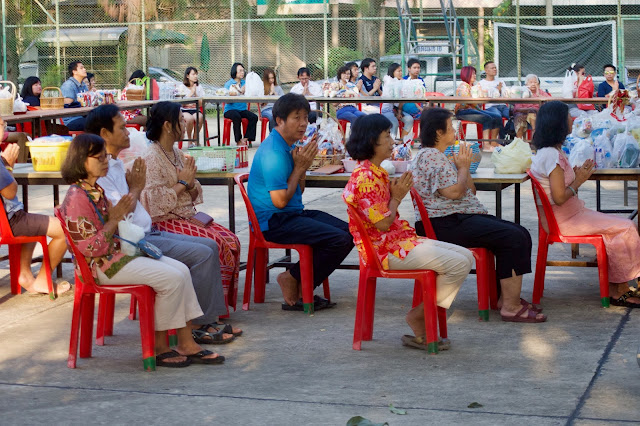 |
| A small altar set at one end of the platform where Buddhist monks sit during the ceremony. The string wrapped around the Buddha statue will be held by the monks during the ceremony. |
The event begins with a half hour of chanting by the monks, who sit on a platform facing the audience who are seated and hold their hands in the traditional "wai", a gesture of respect. At the end of the ancient chant (in Pali language), the monks recite a prayer that is echoed by the devotees. This is followed by offering the monks a meal, and then ceremonial alms giving. This particular ceremony lasted for two and a half hours.
Following is a photo documentary of the new year's event, which is typical throughout the kingdom and other Buddhist countries who also celebrate new year's day in April. Each photo has a caption that details the particular activity.
Please feel free to share this blog post!
All photos are © by the author. It is illegal to use any photograph without permission. If use of any photograph is desired, please contact the author at jsscience@yahoo.com.
 |
| Monks from a meditation center wait quietly for the ceremony to begin. |
 |
| These young assistants to the monks wait in the shade for the ceremony to begin. |
 |
| Food is prepared and set for the monks who will eat after the first part of the ceremony. |
 |
| People listen in respectful silence as the monks chant. Not all Thais participate in these ceremonies. As an example, many played tennis in the courts next to this one as the ceremony took place. |
 |
| Monks chant in traditional Pali language, connected by a cotton thread that is tied to a Buddha image. |
 |
| A woman adjusts her daughter's traditional Thai outfit as another daughter listens to the chants. |
 |
| Roses and candles that will be given to the monks are taken around to give people an opportunity to take part in the blessing. |
 |
| Part of the Songkran tradition is the pouring of scented water (usually with flower petals as shown here) on the hands of elders and on Buddha images. This is a small altar set up for devotees to participate in this tradition. |
 |
| Devotees wait in line to pour water on a Buddha statue on a small altar. |
 |
| Ashes of loved ones are brought in urns for blessing by the monks and pouring of water on the remains. |
 |
| Monks eat first. |
 |
| A young boy waits to take a basket of gifts to the monks. |
 |
| Gifts are placed before the monks. |
 |
| Monks receiving alms. |
 |
| After the ceremony, a senior monk sprinkles holy water by touching the heads of devotees with flowers that have been dipped in the water. |
 |
| As a finale, the monks chant a blessing before departing. |
I was the only westerner to attend this particular ceremony. As I was leaving, a senior monk stopped me to ask if I would be interested in teaching the monks English at the meditation center. I said yes. In exchange, they will teach me about meditation. This was a wholly unexpected outcome, and I feel humbled and honored to have been asked.


No comments:
Post a Comment